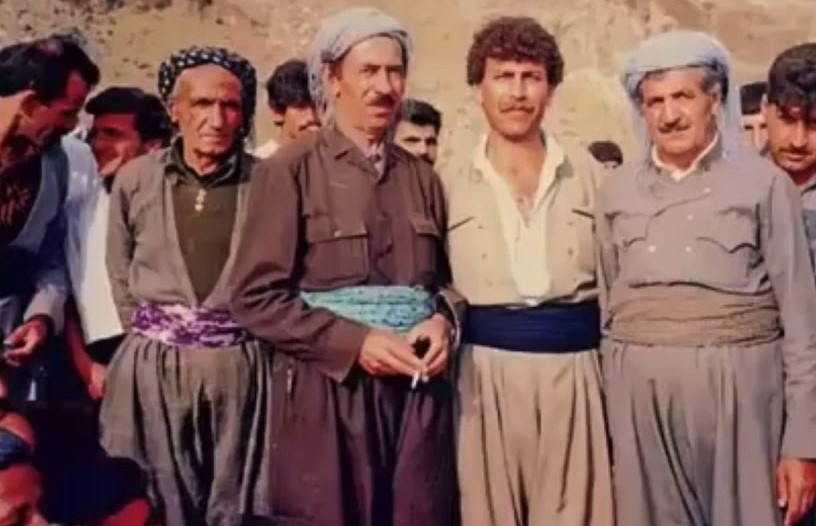Salah Nourani
Kurdish oral literature in the music field is as rich as all the other literary fields with various forms. That is, this music part of the Kurdish oral literature includes several different genres. For instance, Bayt, Hayran, Galo, Aziza, and Payiza to Band are all various forms and styles that together create the music oral literature of Kurdish. Each of these parts possesses its special features.
The band is one of those expressing forms that has not been defined completely and thoroughly yet. A band is a form of rhythmic expression possessing music, rhyme, and meter. It is a part of music oral literature in the Kurdish language. This form of expression like Heyran, Bayt, and the other oral literary genres does not have a particular and unique meter. That is, if in Bayt genre, is to start with a story; in Band, there are no such special features. Band can include short narrations but it is not a rule to narrate the story at the beginning of the Band. There are many other topics expressed in Bands that do not include any kind of narration but they are still identified as Bands. Whatever kind of events that could happen in a story and can be expressed within a framework can be identified as a narration.
"H. Porter Abbott" in his book, "Narrative Literacy" (The Cambridge Introduction to Narrative) says: simply saying, narration means to represent the event or a set of events. For example, he wrote about simple events: when they say a flea stung my cat since an event has been narrated, even if it is not strange or valuable, it is still a fictional narrative.
If we evaluate Bands based on this, most of the Bands include minor narratives. For example, when in the "Gawhare" band it is said:
You are banned in the summer house/ he will bring you Maro dress/
I will sacrifice myself for the smugglers/ they won't break my beloved's heart
A deed or event such as bringing Maro dress for the singer's lover becomes an event that can carry a narrative. However, all of the Bands do not have such features.
Another feature of Bayt and Heyran is emphasizing the expression of love by the girl and the boy for one another. In Bands, however, such expressions can be included or not, social or even satirical expressions can be heard in Bands. For example, a part of Bands which are mostly sung by men, express social subjects about the past which is forcing girls to marry someone they do not like. In such Bands, the singer expresses and criticizes such phenomena indirectly.
I will die for you/ your body looks like a reed/
For my deceased sake/ you, who have tormented me with your beauty/
Your husband looks like a Jew from Al Aqsa/ please do not stay with him
Here, the singer tries to express his love for his lover in the first few lines to pave the way for expressing that his lover has an unpleasant marital life with her husband. Or in another Band:
She is skillful in hunting at night/ just like Hama Tal of Baneh/
I wish your husband's house collapses/ just like Khalifan's gypsies
In another Band:
I hope your ugly husband dies/ I seek my wish from Ahmad Kor
Another Band:
I hope various kinds of diseases/ will make your husband sick/ everyone agrees with me
All of these indicate that the singer has sung about an unfair social situation that has happened to his lover or he has seen such situations in society in general publicly to emphasize such unpleasant situations and gradually these Bands have become a part of people's humming commonly recited by all.
According to the love aspect, we cannot define Band definitely, but rather determine its limits. There are minor narratives in band, or love expressions, although they have been expressed shortly. There are also social aspects mentioned in Bands.
"Meter and rhyme" are another aspect of Band that can be evaluated. Most of the Bands have a syllabic meter. They are made of short lines of 4 + 3 syllables. Sometimes, like Masnavi poetry, they have two lines in 4 + 3 syllables with independent rhymes and sometimes they have a Qat'e poetic form (short lines). That is, the second line of the Band has the same rhyme with the rest of the second lines.
It is normal for the singer to change the Band's poetic form from the middle of it.
Sometimes the Bands are a combination of Qat'a (short lines) and two-line form.
In the new forms of two-line Bands, the second line and the fourth line have the same rhyme. Thus, we can say that the Band includes the extempore expression of the singer who has sung it "spontaneously" at a party choosing a subject based on the theme of the party or whatever he had in mind which could include a variety of topics from love to religious subjects. The singer also paid attention to the rhymes and meter of his Band. However, rhyme is more important than the meter of the poem. The more a singer uses rhyme in his Band, the more important that part of the Band is which also indicates the great ability of the singer.
This is why, if the singer had more rhymes in his mind, he could use them without listening to any special songs. However, the most common form is the one we mentioned earlier consists of Qat'a and two-line poems. For the subject and content, the singer is mostly concerned with expressing love in a short narrative which shows the two lovers have failed to unite. Mostly, the boy is disappointed and the Band expresses his regrets. Although there are other contents for Band, too.








